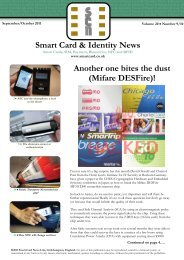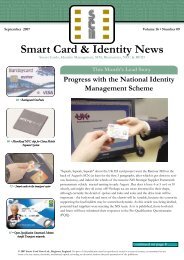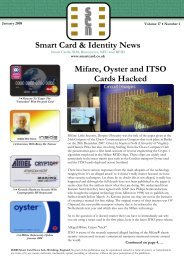Smart Card Identity News - Smart Card News
Smart Card Identity News - Smart Card News
Smart Card Identity News - Smart Card News
You also want an ePaper? Increase the reach of your titles
YUMPU automatically turns print PDFs into web optimized ePapers that Google loves.
Rumours From the Front Line<br />
By “The Squeaker” (a source who wishes to remain anonymous)<br />
This month Oracle has agreed to buy Barossa Inc, a privately held company founded in<br />
May 2003 and headquartered in Santa Clara, California. Bharosa offers online security<br />
solutions to protect against the rising risks of Phishing, Trojan and Proxy-based fraud.<br />
Their Tracker and Authenticator products offer purely Web-based, multi-factor authentication<br />
and online fraud monitoring and detection. Bharosa means 'Trust' in Hindi and<br />
the core of their products is that it uses secure virtual authentication devices for entering<br />
passwords on-line even if the terminal can't be trusted. The value of the sale is so<br />
far undisclosed.<br />
In 2005 Oracle also bought Oblix, specialists in Single Sign On technology.<br />
The question here is still whether Oracle can compete with companies such<br />
as IBM, CA, Microsoft, BEA Systems and HP. In recent years CA bought ID<br />
Management specialist Netegrity for $430 million, HP acquired <strong>Identity</strong> Management<br />
software producer TruLogica while BMC acquired SSO supplier<br />
OpenNetworks for $18 million.<br />
<strong>Identity</strong> Management is at the heart of the acquisition trail of these major players<br />
but they are all working on soft solutions and Bharosa is just the latest in a<br />
long line. Look in the next field and we have the likes of Gemalto who quite<br />
clearly are pursuing a hardware token solution to <strong>Identity</strong> Management, who is<br />
right?On a scale of operations Gemalto is barely scratching the surface but<br />
given the regulatory requirements of Sarblanes-Oxley, FFIEC, PCI, GLBA and<br />
others who demand that companies determine higher levels of assurance for<br />
user identities and authorisation we can ask the question whether a soft solution<br />
can be adequate?<br />
Moving back to Bharosa we can start by challenging whether it is possible to trust actions taken at an untrusted<br />
terminal. Clearly this is a contradiction, if the terminal is subverted by an adequately resourced attacker<br />
then any operation can be compromised even the browser where Bharosa places its trust. Clearly this is not<br />
adequate, there has to be some level of trust in the terminal and the Bharosa tracker product also sets out to<br />
identify the PC, its location and the user's behavioral profile.<br />
Conversely it seems perfectly reasonable to trust a modern cryptographic <strong>Smart</strong> <strong>Card</strong><br />
token. It represents an effective tamper resistant module and can be evaluated under<br />
Common Criteria and the like. What you can say is that under this model any action<br />
taken at the terminal had to be in the presence of the <strong>Smart</strong> <strong>Card</strong>. But are you any<br />
better off than the software only schema? I shall leave my security experts to pronounce<br />
on this one but what I know is that users don't like carrying widgets.<br />
Opinion<br />
I would feel that just carrying a <strong>Smart</strong> <strong>Card</strong> is OK but not if you have to carry the reader as well, unless that<br />
is it just happens to be an object I already have in my pocket like a mobile phone. Coincidentally this also<br />
happens to have a <strong>Smart</strong> <strong>Card</strong> as well as the reader. This to me makes the Finread terminal with its trusted<br />
keyboard and display obsolete because in principle I could achieve the same thing with the phone particularly<br />
if the architecture of the phone is based on ARM's TrustZone.<br />
Now all that's left is how do I couple the phone to the PC? Not ideal perhaps but we already have the relatively<br />
insecure Bluetooth or infra red if you have the patience and then there is the up and coming (?) NFC.<br />
Where would I put my money? Well for the moment I think ARM has a lot more mileage in this end of the<br />
market. Gemalto has a long history in mobile phones or the SIM card at least but is NFC worth all the effort?<br />
15<br />
<strong>Smart</strong> <strong>Card</strong> & <strong>Identity</strong> <strong>News</strong> • July 2007
















